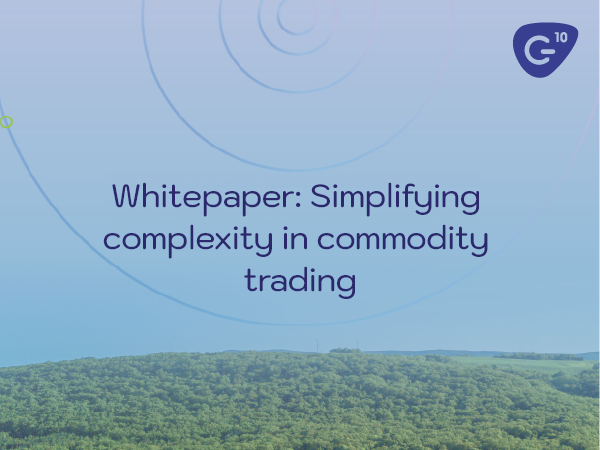The acronym “ESG” is used frequently across the business world these days, often referring to an organisation’s efforts to improve its environmental footprint or conditions for workers in its supply chain. These E and S aspects of ESG are often associated with the supply chain rather than the organisation itself. For example, metals supply chains are currently facing wide-ranging scrutiny over mining practices in the Democratic Republic of Congo, alongside issues with hazardous pollution and the energy costs of smelting and processing.
Not forgetting Governance
However, ESG does not just incorporate environmental and social issues. The Governance section is often overlooked in the discourse, and this is possibly the most immediate area of ESG for many organisations.
Metals and concentrates traders can be removed from both environmental and social risk factors by both geography and by the supply chain. If they do not have information as to a shipment’s origin in a readily usable format then they are unable to confirm it was mined ethically, or what its full environmental impact is.
Governance, however, is neither geographically nor operationally remote from the core business. Corporate governance means managing the organisation effectively and prudently to deliver long-term success. It is typically chiefly a Board-level responsibility, but it has a role to play in all situations where decisions are made. Done well, it encompasses all the organisation’s activities, without being intrusive, and even helps teams perform better in their roles, wherever they are based.
Whilst most people are at least aware of some of the environmental and social risks involved in metals trading, it is governance that protects them and the business by mitigating these risks. And it can help protect against many other risks too. The $577 million potential loss that Trafigura took from what it called a “systematic fraud” in nickel trading is only the latest in a string of exposed issues, including one involving nine nickel warrants at the LME.
Governance sets the framework for working with trusted counterparties and within reasonable tolerances to protect against environmental and social risks as well as these more longstanding counterparty risks.
Governance and the CTRM
Commodity Trading Risk Management systems are one of the most ubiquitous governance tools in metals and concentrates trading. The most basic CTRM systems are used for financial risk management in hedging and to ensure portfolio oversight, but a good CTRM or Commodity Management System can provide far more than this.
A good metals CTRM system aids in decision-making by ensuring people have the information they need in the moment to make an informed choice, from traders to operators, risk managers and the C-Suite.
And the best systems include automation that helps your people perform faster, with fewer errors, and ensures that your processes are always followed – an essential component of effective governance. The checks, controls, and automated approval flows also reduce operational risks and human error, leading to more efficient, as well as more compliant, operations.
Know Your Counterparty and CRM tools within a modern CTRM can help in both ESG and wider risk management activities by ensuring that your traders are working with trusted counterparties and have all the approvals and relevant documentation from the counterparty. These tools can include everything from ensuring new contracts are within a counterparty’s credit limit to alerts for outdated sustainability certifications.
And for governance to be effective, it also needs to include an effective auditing mechanism. A good system such as Gen10’s CommOS creates a digital audit of every activity as your people go about their workday. There is no need for them to interrupt their tasks to update reports, or for risk managers to wait until end-of-day or -week reports have been updated by traders after the fact. And as well as these operational improvements, the complete digital audit trail demonstrates compliance with any policies and shows exactly what actions were undertaken, providing another level of supply chain visibility.
Taking governance beyond the CTRM
Commodity Management Systems incorporate more business functions than the traditional CTRM and extend this oversight, automation, and risk management to logistics functions as well. And they mean that your decision makers have access to all your positions in real-time, as contracts and shipments progress through their real-world journey. Closing the data loop across your organisation therefore improves oversight and corporate governance, but it also means your entire team can work more effectively and profitably.
And modern Commodity Management Systems are bringing this governance full circle back to providing oversight and processes for environmental and social initiatives too. As commodity traders are still developing their ESG activities, governance must evolve alongside changing business requirements, and the most innovative Commodity Management providers are doing just that.
For example, Gen10’s NetZero OS allows commodity traders to engage in voluntary carbon markets with all the financial and operational controls they are used to in their physical commodities. And we are also working with our clients to continuously improve our wide-ranging commodity traceability functionality and supply chain monitoring. From live vessel profiles and tracking APIs providing accurate shipment carbon emissions, to supplier audit tools and end-to-end traceability across your processing, Gen10 Commodity Management tools have a wide variety of ways to incorporate governance into your existing operations and into your ESG initiatives as they develop.
All metals traders already have systems and processes in place to ensure governance within their organisation. But if your system is not supporting the smooth running of your existing operations, it could be introducing risks into the business right now, and compromising any environmental and social supply chain initiatives you are involved in now or in the future.
At Gen10, we have several different solutions for metals traders looking to improve their processes in commodity trading and ESG, so get in touch today to find out how we can help your business.
Want to read more?
Subscribe now for monthly updates
By submitting your details you agree that we can store your data and communicate with you. You can opt out of these communications at any time. Read all in our Privacy Policy.



